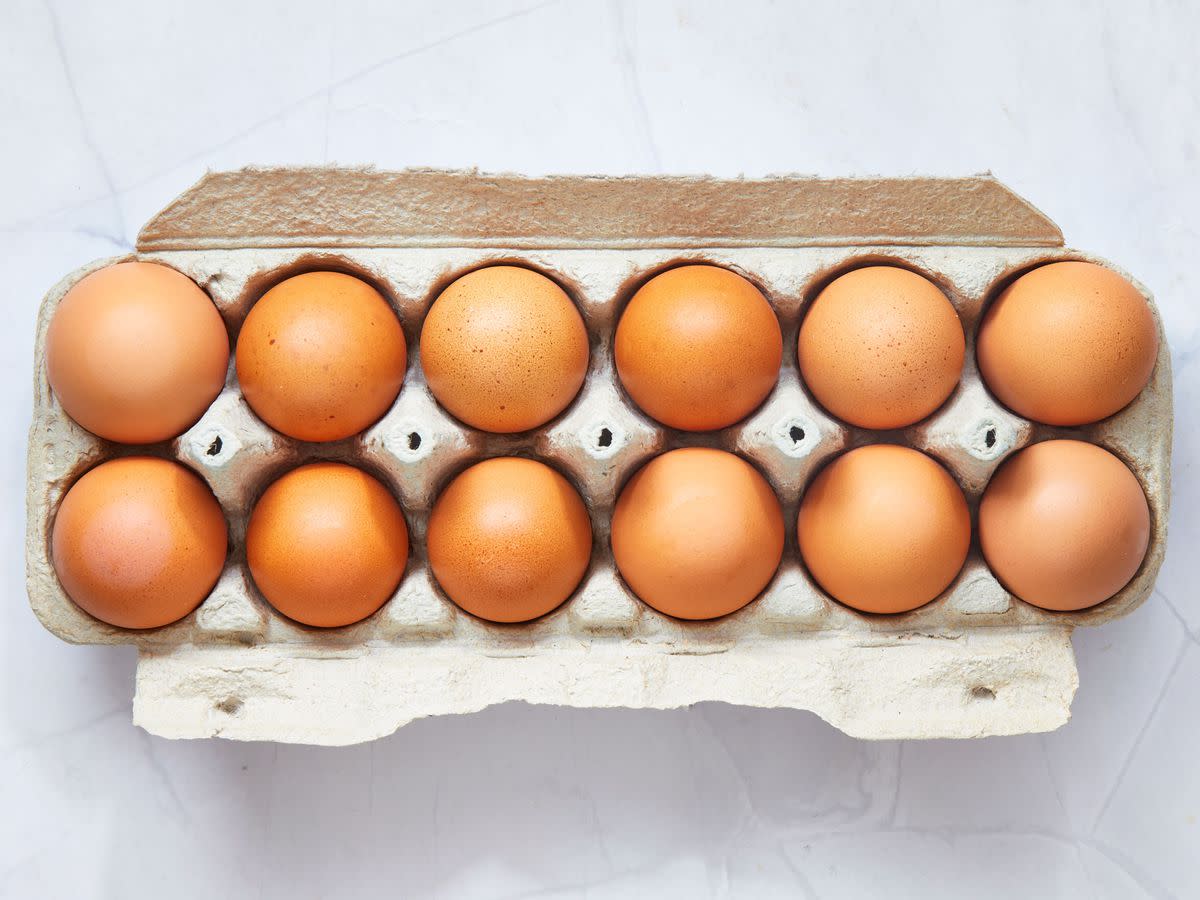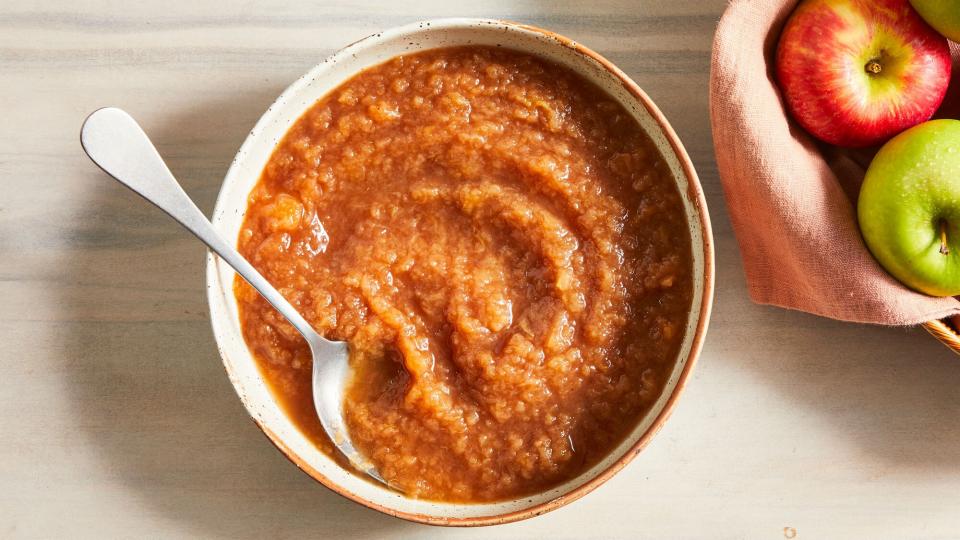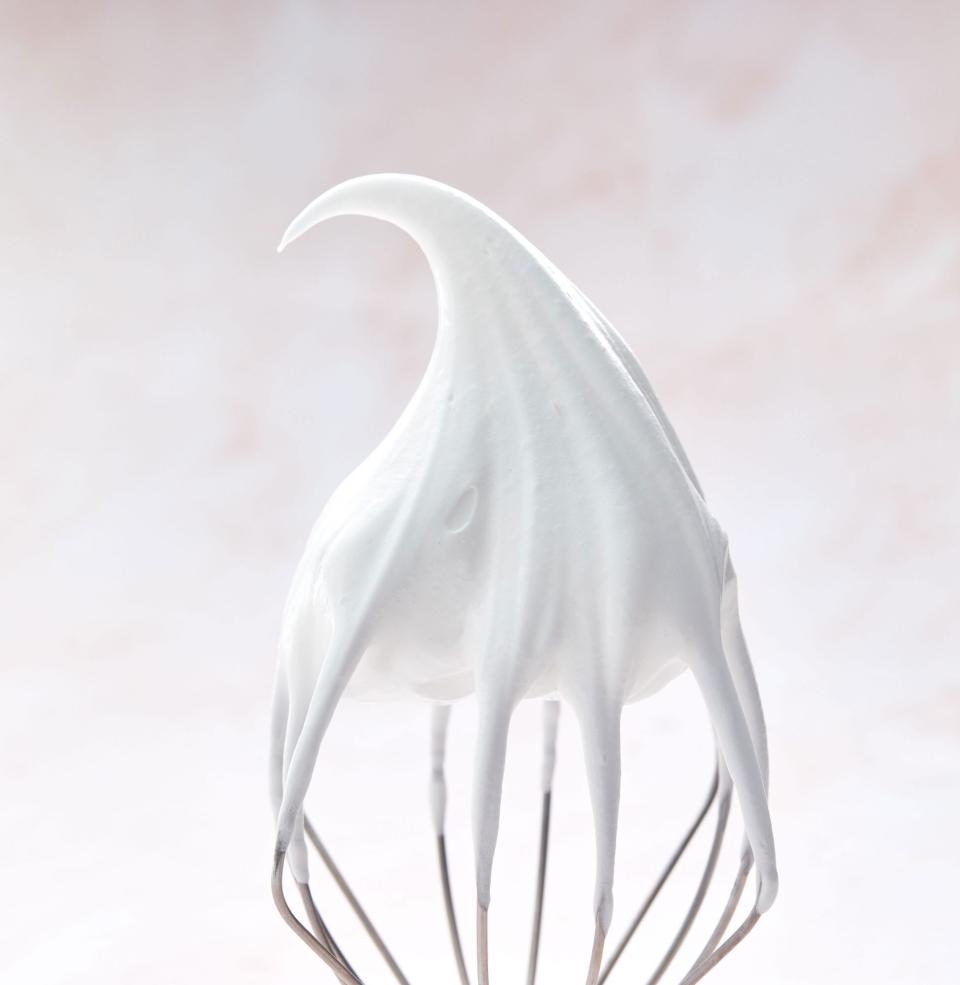What Can I Substitute for Eggs?

Caitlin Bensel; Food Styling: Torie Cox
So you've run out of eggs. There's no time to go to the grocery store. Now what?
Or maybe you need to make a dessert for someone with an egg allergy, or a vegan baked good for a potluck. There are a lot of reasons why you might need a substitute for eggs while baking, but not all replacements are created equal.
Depending on what you're making, from meringue to brownies, it's important to substitute eggs wisely in baking, as they serve many important roles, from acting as a binder to leavening baked goods. You'll want to ensure you're adding the right amount of substitute too: While a large egg is about 1/4 cup in volume, not all replacements are a one-to-one swap.
Here's our guide on how to substitute for eggs when baking, whether you're in a pinch or purposely looking to bake without them.
What Are the Best Egg Substitutes for Baking?
The right egg substitute for your baking purposes will depend on what you're making and what the texture will be in the end. This list of egg substitutes will help you sort out what you should grab if eggs are out of the question.
Fruit Purees
Some fruit purees, like applesauce or canned pumpkin, can be substituted for eggs. Even that overripe banana hanging out on the counter can be mashed and used as an egg substitute.
Fruit purees bind batters, add moisture, but don't leaven baked goods like eggs do, meaning substitutions must be done carefully to avoid a dense dessert. Fruit purees are best used for denser baked goods, like doughnuts, quick breads, and muffins, although they can also work in some cakes.
Applesauce
Applesauce is a great neutral egg replacement, meaning you won't taste any apple in the final product.
When subbing in applesauce for eggs, use ¼ cup for every egg your recipe calls for, and add an additional ½ teaspoon of baking powder to the dry ingredients. You'll need the additional baking powder to prevent the final baked good from being too dense.
Mashed Banana
Bananas are great for adding moisture to baked goods, but one mashed banana can also replace one egg in cakes, muffins, or pancakes.
There are a couple things to keep in mind if replacing eggs with banana. First, the banana must be very ripe to easily mash into a paste and not leave chunks. Second, it will impart some banana flavor in the final product, so it's not suitable as a substitution in all baked goods.
Pumpkin or Sweet Potato Puree
Canned pumpkin is good for more than just pie. Both pureed pumpkin and sweet potato are good egg substitutes in muffins, doughnuts, and quick breads. These purees act as both a binder and thickener, while keeping baked goods moist.
Just like applesauce, use 1/4 cup of puree per egg you're replacing.

Jennifer Causey
Dairy Substitutes for Eggs
While not suitable for vegan recipes, some dairy products can be used in place of an egg in baking and are great for emergency last-minute swaps.
Yogurt
Plain yogurt is an excellent swap for eggs in brownies. For every egg called for, swap in 1/4 cup yogurt.
Since brownies are chewy and dense by design, you don't have to worry about adding in extra baking powder or baking soda to counter the fact that yogurt won't help with leavening.
Buttermilk
Buttermilk is a great egg replacement in cakes and also brownies. You'll similarly want to replace each egg with about 1/4 cup of buttermilk.
Only use buttermilk as an egg replacement in cakes that already have a leavening agent in them, as cakes that get all or most of their rise from eggs, like Angel Food Cake, won't rise with just buttermilk.
Other Substitutes for Eggs
Plant-based cooks and food creatives have found a slew of other egg replacements. Here, a list of egg substitutes you might not have considered but definitely should.
Flax or Chia Seeds
You may have heard the term "flax egg," which is shorthand for subbing an egg with flaxseed meal mixed with water.
One egg equals one tablespoon of flaxseed meal (you can also grind whole flaxseeds yourself in a coffee grinder); mix with three tablespoons of water. Then, let the mixture sit for 10 minutes to thicken before adding it to the recipe.
Chia seeds act similarly, congealing when mixed with water and use the same water ratio, too. Both are great thickeners and help add structure to egg-less baked goods, but much like applesauce can make baked goods dense.
Silken Tofu
Tofu might seem like an odd substitute for an egg, but stay with us. Silken tofu is the softest kind of tofu, which when blended turns into a smooth puree that can be used as a neutral egg replacement. It's a great binder in baked goods, and about 1/4 cup of it is all that's needed to replace one egg.
Aquafaba
You're probably already familiar with this egg white replacement—it's the liquid in canned chickpeas. This liquid, that you likely throw out, is actually a great egg white substitute.
It can whip up into stiff peaks just like egg whites, making it perfect for meringues. Use about two tablespoons of aquafaba per egg white.

Antonis Achilleos; Food Styling: Rishon Hanners; Prop Styling: Audrey Davis
Starches
Cornstarch, potato starch, and tapioca starch can all be used as egg replacements when whisked with water into a smooth paste. For one egg, use two tablespoons of your desired starch mixed with three tablespoons of water. This substitution is best used in enriched cakes and bread, but can act as a thickening agent in custards, too.
Commercial Replacements
You can always start keeping shelf-stable egg replacement on hand, especially if you don't feel comfortable experimenting with substitutions in your baking. Bob's Red Mill and Ener-G make commercial egg replacements available at most grocery stores. These products are a combination of starches, a leavening agent, and psyllium husk fiber (a gluten-free plant fiber that aides in thickening). Each brand provides guidelines on how to use their product in various baked goods.

